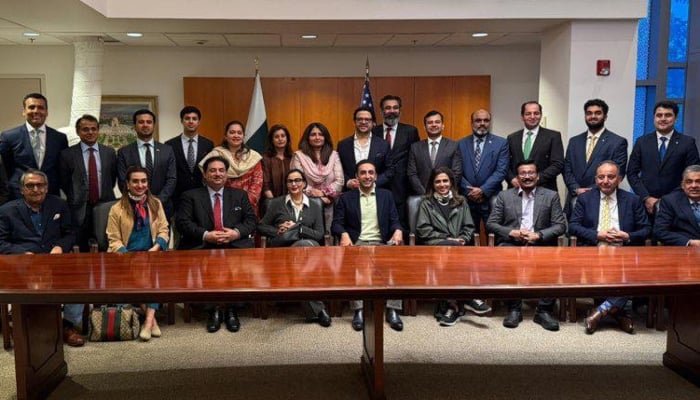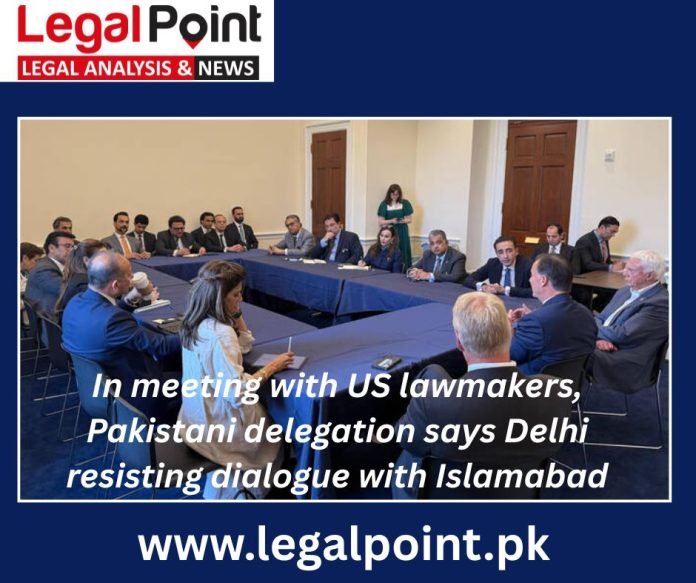In a significant move to strengthen Pakistan’s diplomatic position on the global stage, Pakistan’s diplomatic delegation reached the United Kingdom after a series of constructive meetings with key US lawmakers and officials. Five days of meetings in Washington and New York were successfully concluded by the nine-member team, which was led by Bilawal Bhutto-Zardari, the chairman of the Pakistan Peoples Party (PPP) and a former foreign minister. Their mission was focused on promoting peace, discussing regional conflicts, and highlighting Pakistan’s stance on various key issues, particularly in relation to India. Here in this article, all the important details are delivered on this topic likePakistan’s Diplomatic Delegation Reaches UK 2025 After Successful US Engagements.
Key Members of the Delegation
The delegation, which reached the UK in 2025, included prominent leaders such as Hina Rabbani Khar, Senator Sherry Rehman, Syed Faisal Subzwari, Bushra Anjum Butt, Tehmina Janjua, Jalil Abbas Jilani, Khurram Dastgir Khan, and Dr. Musadik Malik.
Together, they held over 50 meetings with US lawmakers, senators, and diplomats, addressing issues related to regional security, the growing tensions with India, and the importance of peace and dialogue in South Asia.
Agenda and Diplomatic Focus of the Delegation
The primary focus of Pakistan’s diplomatic delegation reaching the UK 2025 was to discuss the ongoing regional peace process and address Pakistan’s concerns about India’s actions in the region.
The delegation highlighted India’s growing aggressiveness, particularly in Jammu and Kashmir (IIOJK), and its impact on regional stability.
Promotion of Peace and Dialogue
The delegation made it clear that Pakistan is committed to promoting peace and constructive dialogue with India. Senator Sherry Rehman emphasized that the Pakistani delegation was not in the US to compete with India’s narrative but to share Pakistan’s own perspective.
She stressed that Pakistan’s goal was not to escalate tensions but to ensure a peaceful and stable environment for the entire region.
Water Security and the Indus Waters Treaty (IWT)
Water security remains a vital issue for Pakistan, especially concerning the Indus Waters Treaty (IWT). Senator Butt warned that if India continues to disregard the treaty, it would set a dangerous precedent for future international agreements.
She pointed out that the IWT is not only important for Pakistan but is also essential for maintaining regional peace. If India violates this treaty, it could escalate tensions and undermine trust in any future agreements between both nations.
India’s Provocations and Aggression
One of the main topics of discussion at the talks was the recent military conflict between India and Pakistan. The Pakistani delegation presented evidence of India’s provocations, particularly the attack in Pahalgam on April 22, 2025, where gunmen killed 26 civilians.
India had blamed Pakistan for the attack, a claim Islamabad strongly denied. This attack led to a brief military engagement between the two countries.
The delegation made it clear that Pakistan would not tolerate any unprovoked aggression and would respond accordingly if India chose to escalate the conflict further.
Pakistan’s Diplomatic Outreach in the US and UK
Strong Support from US Lawmakers
According to Senator Sherry Rehman, the Pakistani delegation received a positive reception in Washington, where many American lawmakers understood Pakistan’s position and concerns regarding India’s behavior.
She mentioned that discussions about the weaponization of water and India’s belligerent actions were well-received by the US Congress members. These meetings were pivotal in strengthening Pakistan’s diplomatic relations with the US.
As lawmakers agreed that the weaponization of water by India poses a serious risk to regional stability.
Pakistan’s Appeal for Peace at the UN
The delegation from Pakistan also made a presentation before the United Nations while in the United States. Syed Faisal Subzwari, a key member of the delegation, shared that Pakistan emphasized its desire for peace despite its military capabilities.
He urged the global community to convey to India that two nuclear powers cannot progress in an environment of hostility.
Subzwari also highlighted that India’s actions were aimed at gaining immunity for aggression, which Pakistan would not accept.
Impact of India’s Actions on Global Perception
Khurram Dastgir Khan pointed out that India’s recent actions have negatively impacted its global image. He remarked that the international community now sees India’s aggressive behavior as a source of instability rather than a stabilizing force in South Asia.
This was particularly evident during the recent conflict when India failed to provide evidence to support its claims against Pakistan and launched attacks on civilian infrastructure in Pakistan without any justification.

The Future of Pakistan-India Relations and Global Security
The Risk of Escalation and the Need for Diplomacy
One of the most important takeaways from the Pakistan’s diplomatic delegation reaching the UK 2025 was the pressing need for diplomatic efforts to prevent further escalation.
Jalil Abbas Jilani, another member of the delegation, emphasized that Pakistan is a peace-loving country that seeks to resolve issues through dialogue. He noted that despite India’s aggressive posture, Pakistan remains committed to peaceful negotiations.
However, if India continues to pursue a confrontational path, it could lead to catastrophic consequences not only for the two countries but for the entire region.
Global Powers’ Role in De-escalation
The Pakistani delegation also appealed to global powers to step in and help de-escalate tensions. Pakistan’s leadership urged the United States, as well as other global players, to press India for a neutral inquiry into the Pahalgam incident and to facilitate talks between the two countries.
The delegation made it clear that a permanent peace agreement is the only way to ensure long-term stability in the region.
Pakistan’s Military Capabilities and Peaceful Intentions
Despite demonstrating military superiority in past conflicts, Pakistan’s stance remains one of peace. Pakistan’s military actions have been aimed at defending its sovereignty rather than pursuing aggressive warfare.
The delegation pointed out that while Pakistan is capable of defending itself, it is always ready for peace talks, provided India is willing to engage in meaningful negotiations.
Conclusion: The Road Ahead for Pakistan’s Diplomacy
As Pakistan’s diplomatic delegation reaches the UK 2025, the focus remains on sustaining diplomatic efforts and building on the positive engagements held in the US. The delegation’s outreach has been critical in presenting Pakistan’s stance on regional security, the Indus Waters Treaty, and the importance of addressing India’s aggressive actions.
With growing international support and a clear message of peace, Pakistan hopes to continue its diplomatic success, especially as tensions between India and Pakistan continue to evolve.
In conclusion, Pakistan’s commitment to peace and dialogue remains steadfast, but it is also clear that the country will not tolerate aggression and will respond if necessary.
The future of Pakistan-India relations lies in the hands of both nations and their willingness to engage in meaningful dialogue to resolve their differences.
FAQs: Pakistan’s Diplomatic Delegation Reaches UK 2025
1. What was the purpose of Pakistan’s diplomatic delegation reaching the UK in 2025?
The primary goal of the diplomatic delegation’s visit to the UK was to continue Pakistan’s efforts in promoting peace and dialogue, particularly with respect to the escalating tensions with India.
The delegation aimed to present Pakistan’s stance on regional peace, the Indus Waters Treaty, and the ongoing conflicts in Jammu and Kashmir. The team also engaged with key international bodies and lawmakers to garner support for Pakistan’s position on peace and security.
2. Who were the key members of Pakistan’s diplomatic delegation?
The nine-member delegation was led by Bilawal Bhutto-Zardari, former foreign minister and Chairman of the Pakistan Peoples Party (PPP).
Other members included Hina Rabbani Khar, Senator Sherry Rehman, Dr. Musadik Malik, Khurram Dastgir Khan, Jalil Abbas Jilani, Tehmina Janjua, Bushra Anjum Butt, and Syed Faisal Subzwari. These individuals played pivotal roles in engaging with US lawmakers and international institutions.
3. What were the major issues discussed during the delegation’s trip to the US?
During their visit to the US, the delegation discussed several key issues:
- India’s Aggression: The delegation highlighted India’s provocative actions, particularly in Jammu and Kashmir, and the threats it poses to regional peace.
- Indus Waters Treaty (IWT): The delegation emphasized the importance of the IWT and warned that any violations by India could undermine future international agreements.
- Regional Peace: Pakistan’s commitment to peace and dialogue was a major talking point, with the delegation stressing the importance of diplomatic engagement with India.
- Global Stability: The delegation called on global powers to intervene and urge India to engage in peace talks and neutral inquiries, especially regarding recent military confrontations.
4. What is the current stance of Pakistan on its relationship with India?
Pakistan’s stance on its relationship with India remains focused on peace and dialogue. Pakistan wants to resolve differences through diplomatic means, particularly through negotiations concerning Kashmir and the Indus Waters Treaty. However, Pakistan has made it clear that any unprovoked aggression from India will be met with a strong response.
5. How did the international community respond to Pakistan’s position?
Pakistan’s diplomatic delegation received a positive response from many international actors, including key US lawmakers. Discussions about the weaponization of water and India’s aggressive behavior were particularly well-received.
Pakistan’s message of peace and stability resonated with several global powers, who acknowledged the potential risks posed by continued aggression in South Asia.
6. What role does the Indus Waters Treaty (IWT) play in Pakistan’s diplomatic strategy?
The Indus Waters Treaty is a critical element of Pakistan’s diplomatic strategy, as it governs the sharing of water resources between Pakistan and India. Pakistan views the treaty as a lifeline for its agricultural sector and water security.
Any violations by India would not only jeopardize Pakistan’s water supply but could also trigger greater regional tensions, making it a key issue in Pakistan’s diplomatic efforts.
7. What is the expected outcome of Pakistan’s diplomatic efforts moving forward?
The diplomatic efforts of Pakistan, including the recent outreach to the UK, are aimed at achieving a peaceful resolution of the conflicts in the region.
The delegation hopes to garner greater international support for Pakistan’s position and work towards creating a more stable and secure South Asia. While the path to peace remains challenging, Pakistan’s commitment to diplomacy and dialogue remains firm.
Follow Us on Social Media: Legal Point



